Richard England
Date of birth: 2.7.1897
Date of death: 18.10.1978
Area: Pontefract
Regiment: Royal Army Medical Corps (No 1 Field Ambulance)
Family information: Son of Hannah England of North Bailey Gate, Pontefract
Rank: Private
Service number: 106551
War service
The story I have to tell is of Richard England who was born on 2 July 1897 in Pontefract. He enlisted for service in the 1st World War on 8 December 1915 at Pontefract, at that time he was living with his mother, a brother and sister in North Bailey Gate. His father had already died.
On his recruitment paper he was attested for the Royal Army Medical Corps (RAMC) joining for the duration of the war at the age of 18 years 5 months. His height was given as 5 ft 3 7/8 inches, or about 161 cm. He received a pass which sent him to Nottingham for basic training.
We do not know when he was sent to France to join the No 1 Field Ambulance. He sent numerous post cards home, which he asked his mother to save as “he would like to see them later,” some of them written only days apart. He obviously needed contact with home. Comparing communications those had to their families back home, a letter would be like an email today, and a post card a text message, but at snail's pace compared to present day.
Some of the post cards have dates on them but not all. However the Field Censor has passed them all, and those with place names have had the town's name cut out. Some cards show French churches before and after bombing. One of the early cards is date stamped 27 August 1916 from somewhere in France.
A post card dated 30 September 1916 reads “Dear Mother I have not received any parcel yet, and as there are such a lot getting lost don’t send anymore for a while, but you can send the weekly paper if you like. Please keep these cards clean. Yours truly Dick” On some of his post cards Richard requested things such as a pencil, some writing paper and a flash lamp battery as “it’s very dark out here now.” On the 15 November 1916 he asked why they had not written to him - had they gone on strike! On the 28 January 1917 the card read “Too cold to write a letter to you, just sending a card.”
A card to his brother on 1 July 1917 tells him that they are in tents and a on a card dated 13 April 1918 he writes to his mother saying he is in the pink and going strong as ever and asks if she has been so busy reading the war news that she hasn’t had time to drop a line or two.
We also have 3 post card photographs of No 1 Field Ambulance entertainment troop but we don’t know if Richard was involved or not.
The next correspondence to his mother was a telegram on 23 April 1918 stating that he had been seriously injured on the 20 April and was dangerously ill. The sister in charge of the 22nd CCS (22nd Casualty Clearing Station) Miss A Wyllie wrote a note to his mother as well dated 21 April saying he had been seriously injured in the left thigh and back, and his condition is critical.
25 April 1918 Richard himself wrote to his mother “Just a few lines to inform you that a kind lady is going to write you a line or two. I find it very hard to write. Your loving son Dick.” This card was difficult to read as the writing was poor. He had been moved to ward A2. 24 General Hospital. B.E.F. France Etaples where a Lady Mary Bradford wrote that “He was wounded April 20, a severe wound of the buttocks, the shrapnel is out. He is doing at present as well as can be expected, and receiving every care. His best love.”
-On 5 May 1918 Richard’s mother had yet another letter from Ward 4 Military Hospital, Colchester. Essex, stating that the condition of Pte England who is a patient of the hospitals gives rise to anxiety, and it is considered desirable that she should visit him if possible. Enclosed was a half fare voucher to enable her to travel at half ordinary fare.
He moved around several hospitals in England having treatment, and was discharged from the RAMC no longer physically fit for war service 5 July 1919. When he was discharged his height was recorded as 5 ft 7 inches (about 168cm) so he had grown 7 cm whilst in the army, and served 3 years and 197 days with the colours.
His treatment continued for a few more years, we have a post card dated 1920 when he was still receiving treatment.
Due to the severity of his war wounds Richard had numerous operations lasting until about 1922. Whilst an in-patient he was given occupational therapy and worked a tablecloth on even weave fabric.
Unfortunately the thread was not colourfast as today it would have been and some of the colours have run when washed. He did tell me he quite enjoyed working it and his mother was pleased to receive it.
Family story
While Richard was at war his mother and sister boosted his morale with correspondence and parcels, which seemed to have taken about 2 weeks to get to him. They must have sent food because on one post card he thanks his sister for the beautiful cake; he said he had made a big hole in it that night. (His sister worked for Wordsworths Bakers of Pontefract). In one post card Richard thanks his family for the root, ”its going down well, you couldn’t have sent anything better.” I think it may have been Liquorice Root, which was grown around Pontefract.
His elder brother John Pearson England, born 10 March 1890, also joined up in WW1, No 286910. He was married and had a baby daughter born 1915, and he also sent post cards home to his family, who lived at South Bailey Gate, Old Church, Pontefract. He joined the Army Supply Corps or A.S.C which was responsible for taking supplies to the thousands of British Troops fighting abroad. The countryside was devastated by war so food would have to be transported along with equipment and ammunition for the fighting. This was transported to the front by horses, motor vehicle, railways & waterways, John was in the motor transport section.
I never knew what occupation my father Richard, or Dick as he was sometimes called, had immediately before he entered the army. However according to the 1911 census he was working in a saw mill in Pontefract at 13 years old.
His brother John was aged 21 in 1911 and a brush maker. He started his apprenticeship in 1904 when he left school aged 14 years, and worked for Thomas Jones at the Borough Brush Works, Pontefract.
They both lived at home with their mother Hannah and sisters Clara and Emily.
After the war Richard returned to live with his mother who had now moved to 13 Carlton Villas, Pontefract. He walked with a limp and wore a calliper to give stability to his leg and aid walking. One of his interests was photography, and he developed his own photographs at one time. Also he had a motorbike and was a successful member of Pontefract and District Motor Club in the 1920s.
In 1937 he moved to Outwood and bought a house with an acre of land and started a Market Garden business, growing rhubarb and vegetables.
Later in 1940 he took over his Uncle's butchers shop in Stanley, Wakefield where he worked until he retired, aged 70 years.
The war wounds left him disabled, but that didn’t stop him from doing what he wanted to do. He was a very determined man.
My father (Richard) would never speak much about his time in the war or his injuries. He did say once when we were talking about blood groups that he had been given a blood transfusion. When I asked him more about it he said that a man sat by his bed, the blood passed via a needle and tube to a needle in his arm. When I asked why the blood wasn’t in a bottle, he said they didn’t do that. They had a set period of time for the blood to transfuse, and then the needles were removed. By today’s standards that all sounds very strange, but if he was badly wounded and needed blood that maybe saved his life. They must have taken and grouped blood sample for it to be a match. I have found where this is described as a direct form of giving a blood transfusion.
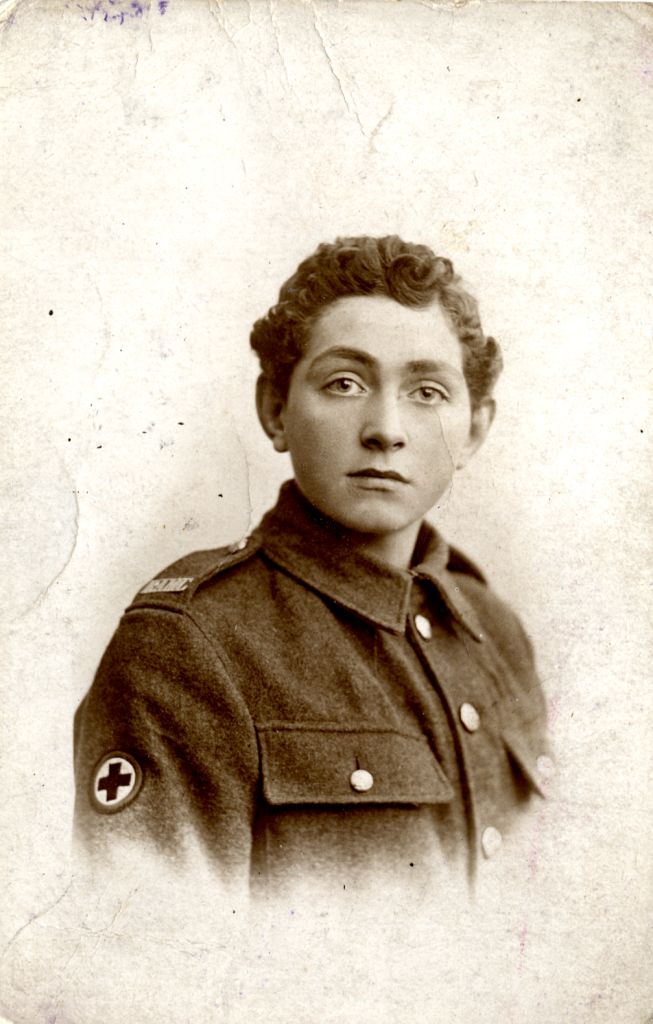 Richard England when he first joined up
Richard England when he first joined up
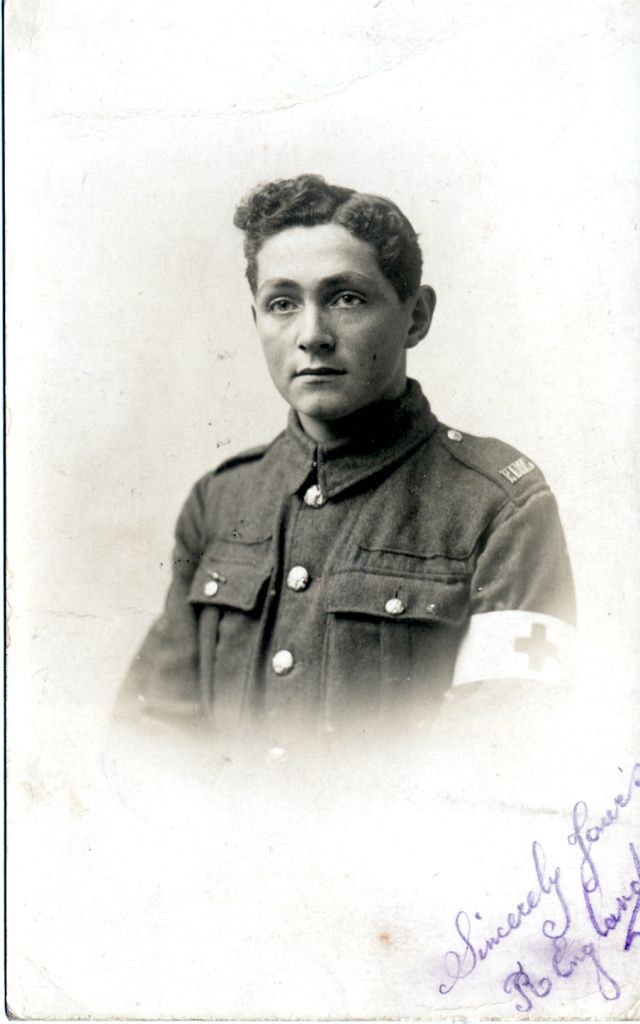 Richard later in his service, with his signature
Richard later in his service, with his signature
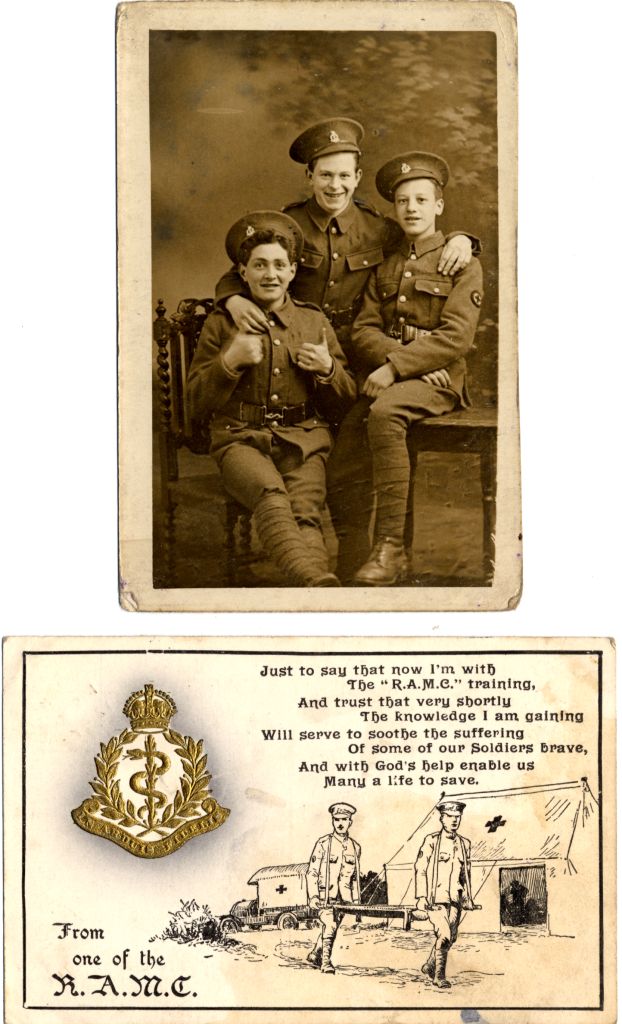 Richard with some pals and a postcard he sent to his mother
Richard with some pals and a postcard he sent to his mother
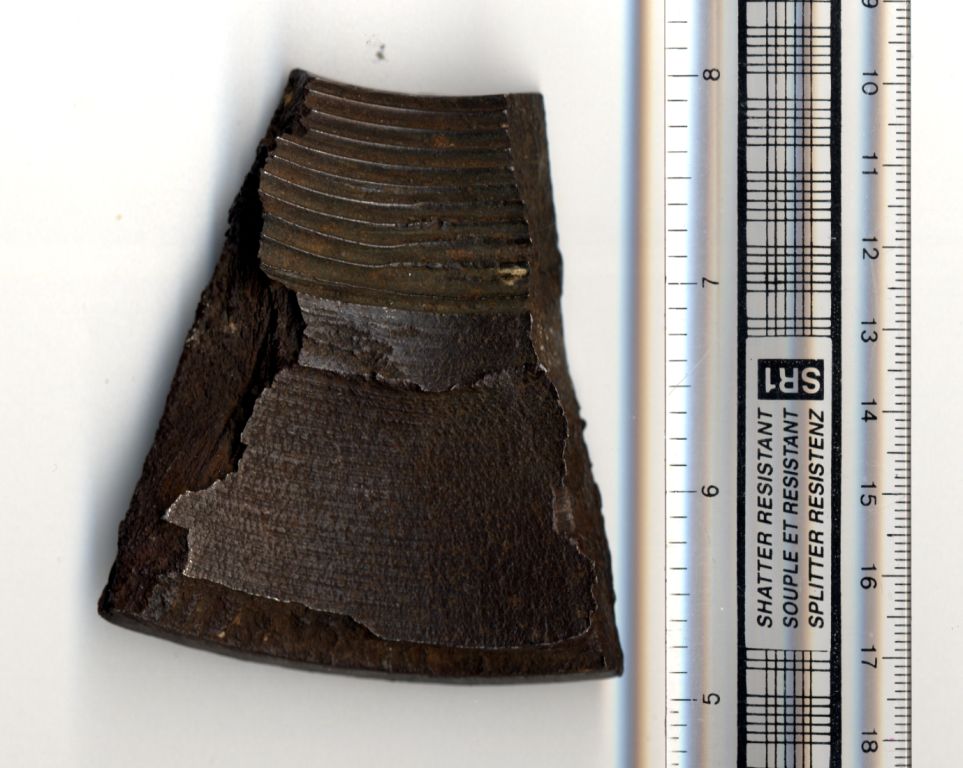 Shrapnel
Shrapnel
 Discharge badge and documentation
Discharge badge and documentation
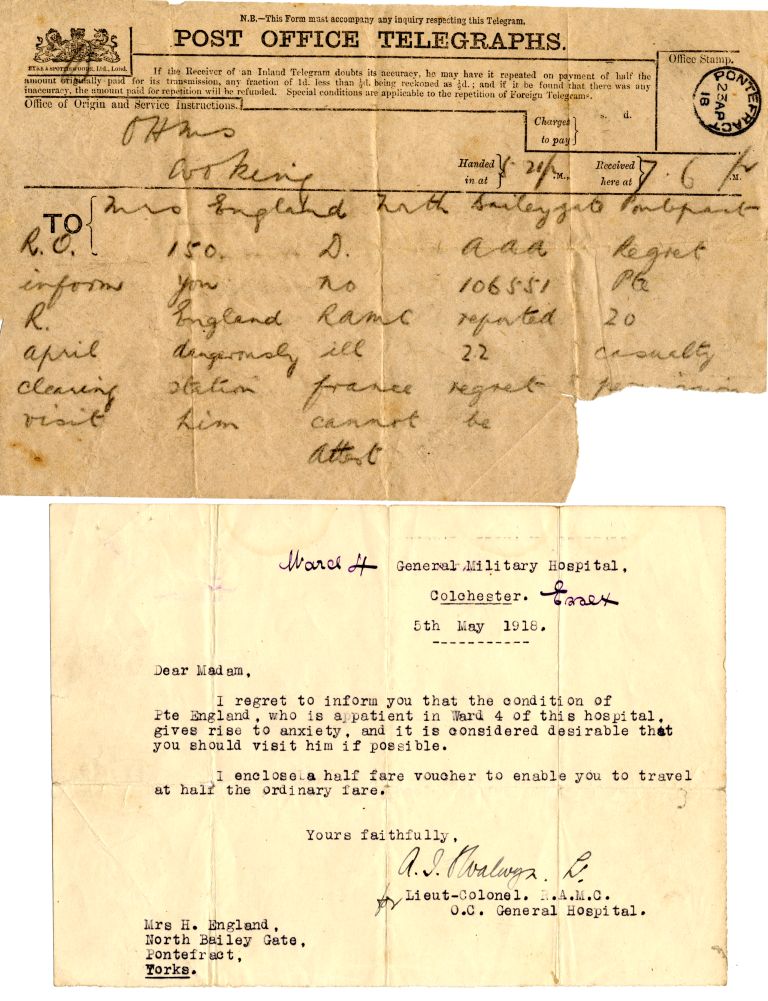 Telegram and letter
Telegram and letter
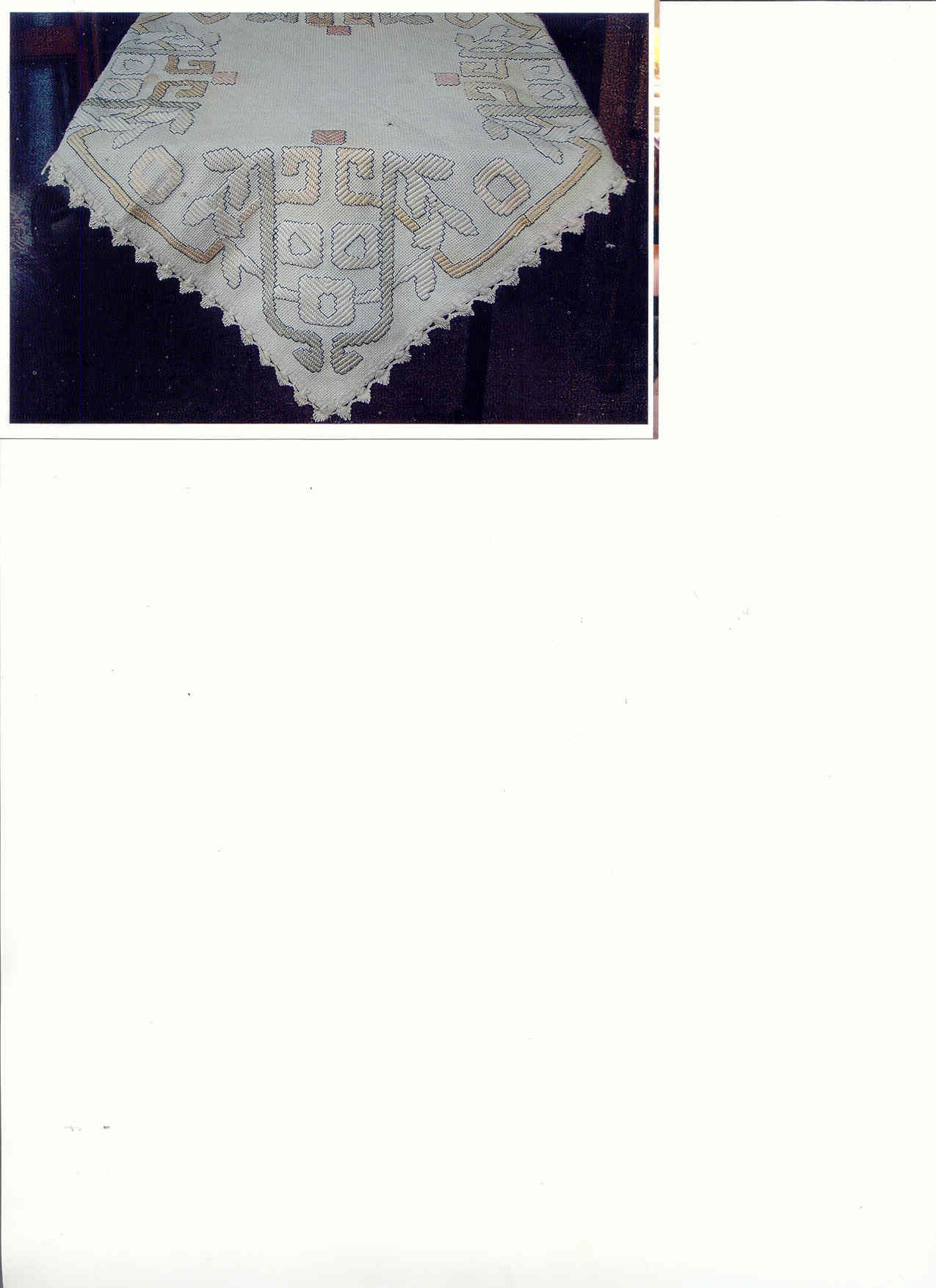 Tablecloth
Tablecloth
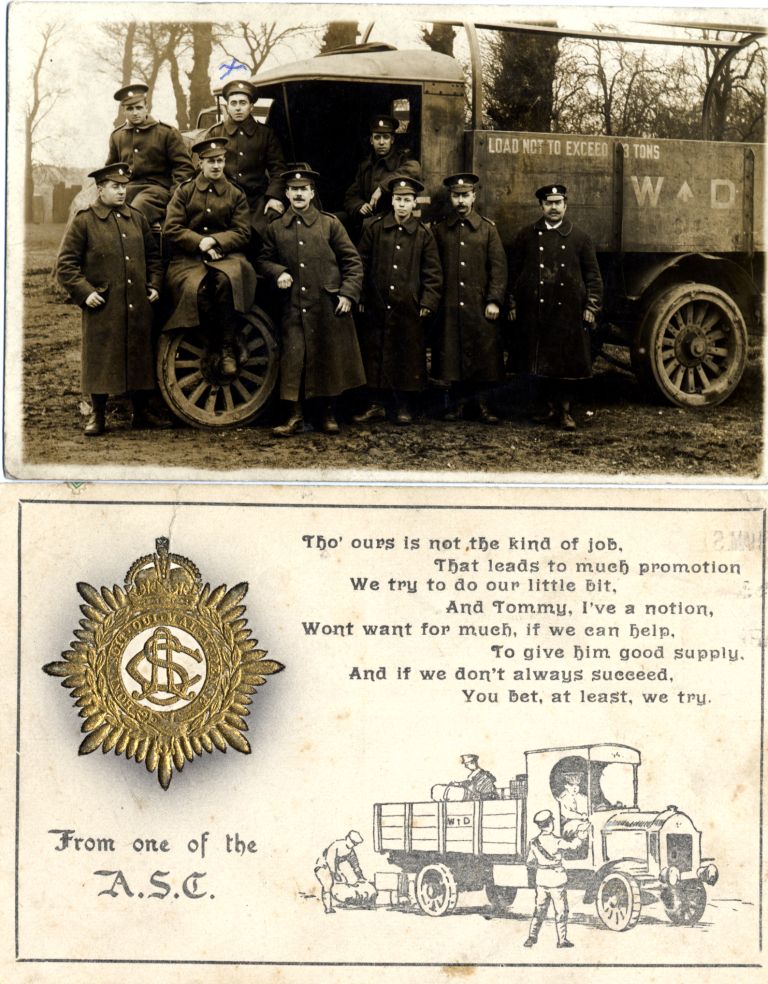 Richard's brother John Pearson England, marked with a cross and a postcard he sent to his daughter
Richard's brother John Pearson England, marked with a cross and a postcard he sent to his daughter

